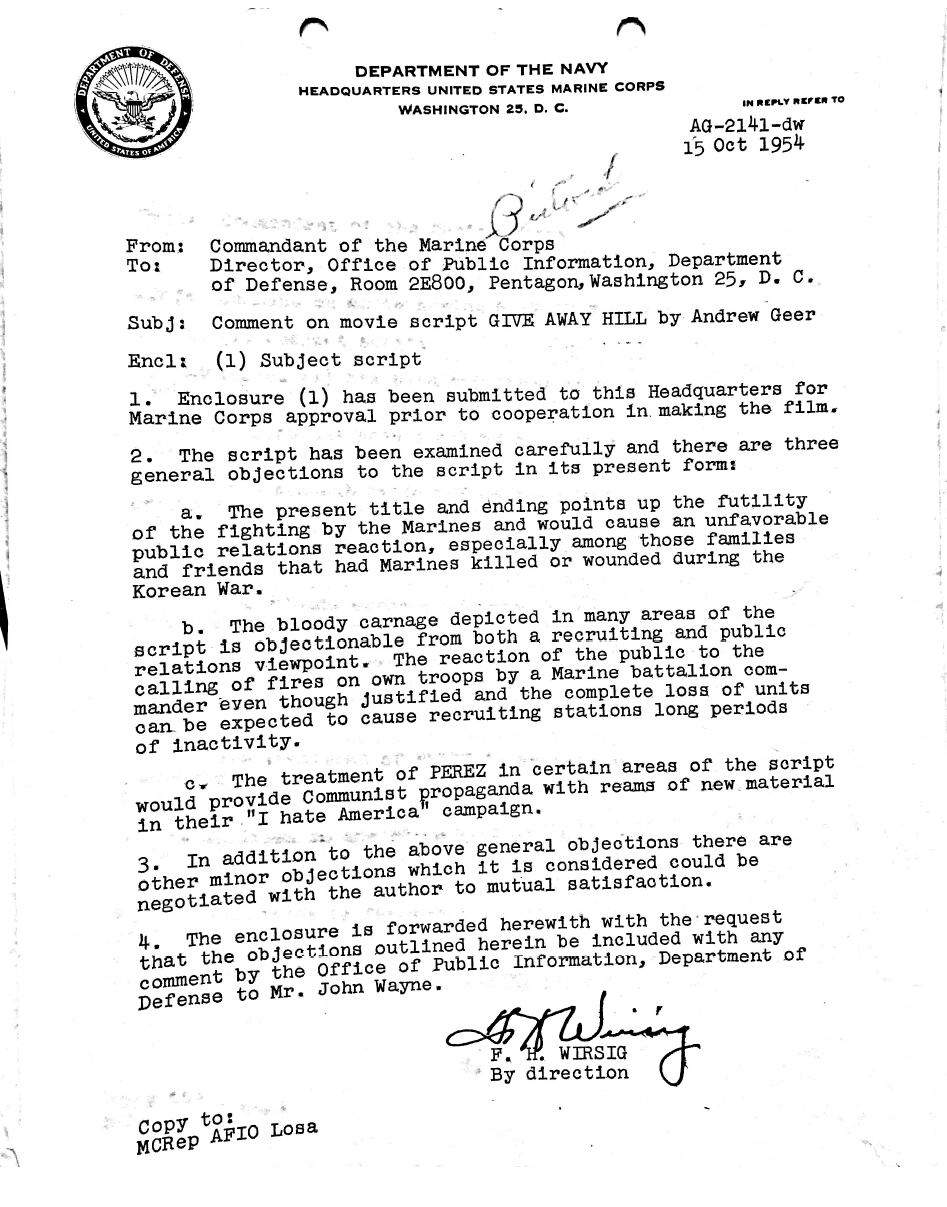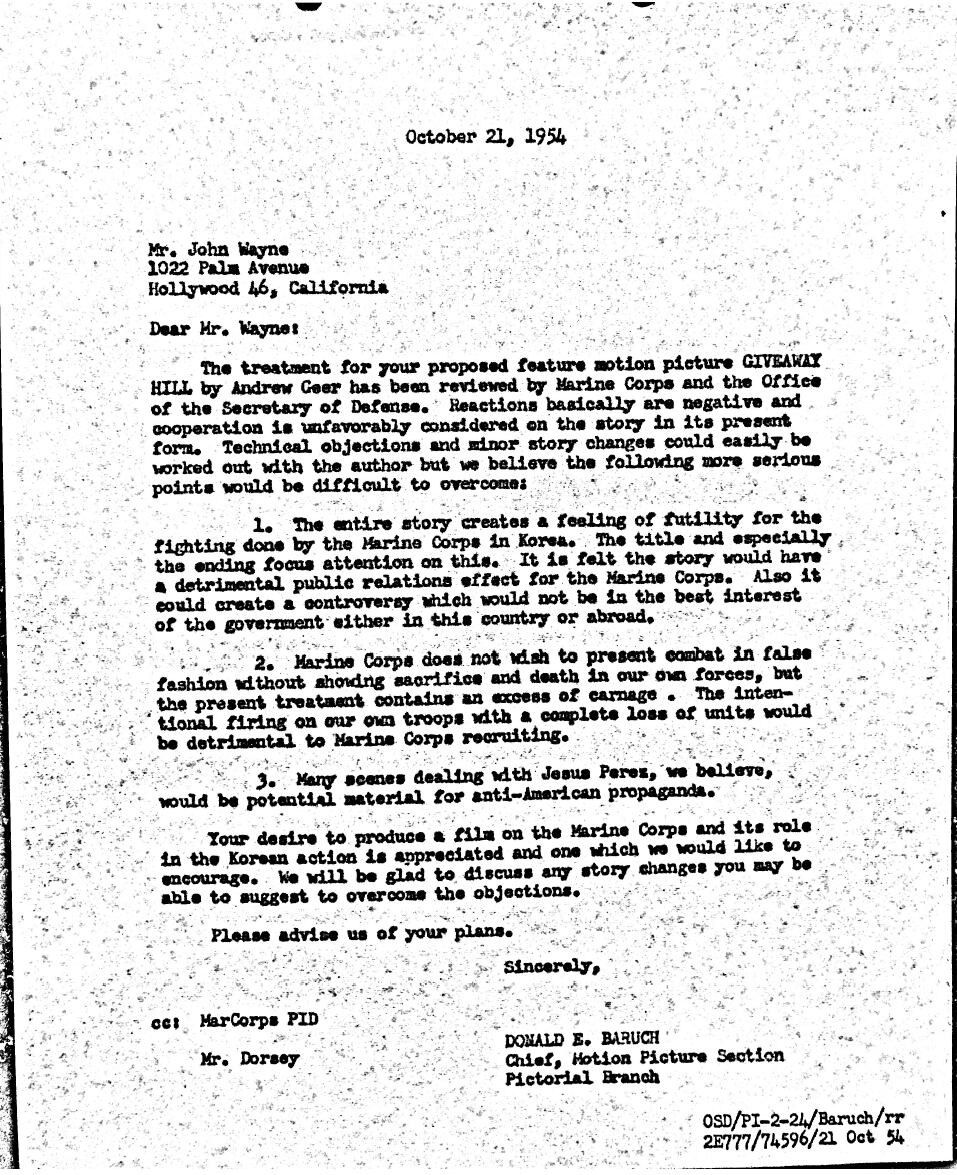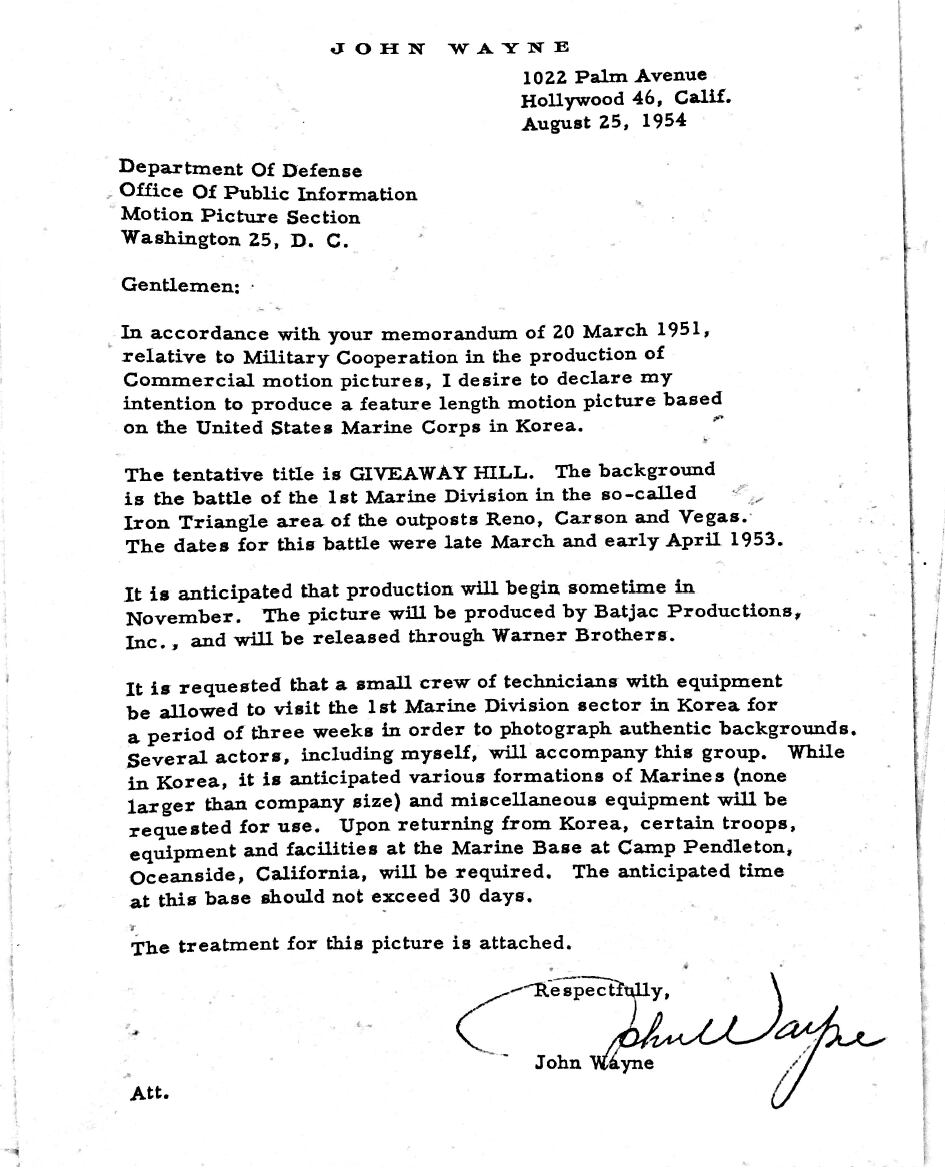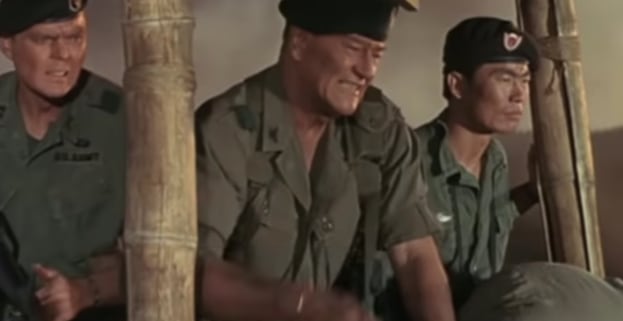From the late-1940s through the mid-60s, Hollywood could count on the Defense Department to lend a hand in making realistic war movies. However, in 1954, the Marine Corps effectively killed a proposed John Wayne movie about a bloody Korean War battle because “the story would have a detrimental public relations effect for the Marine Corps.”
In his book “Guts and Glory,” historian Lawrence Suid documented how the Pentagon made many iconic movies possible. The Air Force loaned rare gun camera footage, surplus World War II bombers, and an air field to Twentieth Century Fox for the production of “Twelve O’Clock High.” Another time, the Marine Corps put “Sands of Iwo Jima” actors ― including John Wayne ― through an abbreviated boot camp and allowed Republic Pictures unrestricted filming access to Camp Pendleton and use of an entire Marine battalion as extras.
In return for their assistance, the department required filmmakers to participate in a story and script review process managed by Donald Baruch, a public affairs official at the Pentagon.
For a movie to be made, there were a few key department-held criteria: the film must be “an accurate and authentic portrayal” of the military, it must not negatively affect morale or military operations, and “it must be in the best interests of national defense and the public good,” according to Clair Towne, Baruch’s deputy.
In August 1954, when Wayne wrote to Baruch’s office, he was hopeful that the Defense Department and Marine Corps would be able to help with “Giveaway Hill,” which was scheduled to begin production in November of that year.
The screenplay, a product of Wayne’s company Batjac Productions, was enclosed with Wayne’s original letter but is missing from the Baruch office’s files and archives around the country, dramatized “the battle of the 1st Marine Division in … outposts Reno, Carson, and Vegas” during “late March and early April 1953."
The battle for the “Nevada Cities,” as the outposts were known, was one of the fiercest in the Korean War.
A surprise attack by Chinese soldiers on March 26, 1953, overwhelmed Marines defending the Reno and Vegas outpost, and they were all killed or captured. After five days of savage fighting to recapture the outposts, 1,015 American and South Korean Marines died, and Reno remained in Chinese hands. The U.N. High Command decided to give away the area altogether in May, hence the film’s title.
Andrew Geer, who had commanded 2nd Battalion, 5th Marine Regiment, 1st Marine Division during the war, wrote the screenplay. Though his battalion remained in reserve during the battle, it’s possible he close with some of the Marines from the regiment’s 1st Battalion, which was charged with manning the outposts.
Wayne requested that a film crew and the film’s stars “be allowed to visit the 1st Marine Division sector in Korea” so they could shoot combat scenes against authentic terrain. He also asked for “various formations of Marines (none larger than company size)” to participate as extras. Records show Wayne also planned to shoot scenes at Camp Pendleton, California, where he anticipated needing “certain troops, equipment, and facilities” for no more than 30 days.
Baruch forwarded Wayne’s request and Geer’s story treatment for Marine Corps' evaluation. Brig. Gen. Frank Wirsig reviewed the story and told Baruch in a Oct.15, 1954, memo that he had serious concerns about the film.
Wirsig was evidently appalled by “the bloody carnage depicted in many areas of the script,” and deemed it “objectionable from both a recruiting and public relations viewpoint.” He was particularly worried that “the calling of fires on own troops by a Marine battalion commander even though justified can be expected to cause recruiting stations long periods of inactivity.”
The general was also adamant that the “present title and ending points up the futility of the fighting by the Marines and would cause an unfavorable public relations reaction, especially among those families and friends that had Marines killed or wounded during the Korean War.”
Wirsig’s most notable objection, though, was to a character named “Jesus Perez,” who was likely a Latino Marine. “The treatment of Perez in certain areas of the script,” he said, “would provide Communist propaganda with reams of new material in their ‘I hate America’ campaign.”
While the story treatment is not available to confirm, Wirsig’s complaint implies that Perez’s characterization may have included overcoming racial discrimination at home or from his comrades.
When Baruch conveyed the Marine general’s criticisms back to Wayne in an Oct. 21, 1954, letter, he explained that the “reactions basically are negative and cooperation is unfavorably considered on the story in its present form.”
He made it clear to Wayne that the Marine Corps would not provide any assistance unless the story changed.
“We will be glad to discuss any story changes you may be able to suggest to overcome the objections. Please advise us of your plans,” Baruch wrote.
It seems Wayne never responded — there isn’t a record of any reply in the official archival records of Baruch’s office, nor is there one in Baruch’s personal papers at Baruch College in Manhattan.
Wirsig and Baruch’s vehement objections likely convinced Wayne to drop the project altogether. “Giveaway Hill” was never made into a film, though Wayne and Geer would later collaborate once again when Wayne starred in “The Sea Chase,” which was based on a bestselling novel by Geer.



Davis Winkie covers the Army for Military Times. He studied history at Vanderbilt and UNC-Chapel Hill, and served five years in the Army Guard. His investigations earned the Society of Professional Journalists' 2023 Sunshine Award and consecutive Military Reporters and Editors honors, among others. Davis was also a 2022 Livingston Awards finalist.
Tags:
john wayne moviesjohn waynewar movieswar hollywoodJohn Wayne Korean War movie never madeGiveaway Hill movie never filmedJohn Wayne Giveaway Hill Marine CorpsAndrew GeerBrig. Gen. Frank WirsigIn Other News















